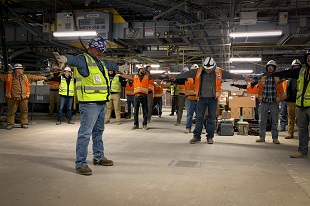 Saturday, May 4, 2024
Saturday, May 4, 2024  Saturday, May 4, 2024
Saturday, May 4, 2024 
It has been five years, but the memory still haunts construction superintendent Michelle Brown.
A co-worker ended his workday by giving away his personal cache of hand tools to his colleagues. It was a generous but odd gesture; no one intending to return to work would do such a thing.
The man went home and killed himself. He was found shortly afterward by co-workers who belatedly realized the significance of his gifts.
“It’s a huge sign, but we didn’t know that then,” Brown says. “We know it now.”
The suicide of that construction worker for RK in 2014 became a pivotal event for the company, shaking its 1,500 employees, including co-owner Jon Kinning.
The death brought home some painful facts. Construction and mining (including oil drilling) have the highest suicide rates of all occupations, according to data from the Centers for Disease Control and Prevention. And the suicide rate for working-age adults has been rising in the U.S., increasing by 34% to 17.3 suicides per 100,000 in 2015 from 12.9 in 2012.
Kinning spent the months after the incident meeting with industry leaders and suicide experts.
The result: RK, which was founded 56 years ago by Kinning’s father, eventually put together what is now regarded as a model for suicide prevention in the construction industry. It involves 24-hour access to counseling services, lenient leave policies and crisis training for managers, among other things.
Most critically, says Kinning, the company embraced lots and lots of open talk about mental health.
“It’s a crisis in our country. It’s a crisis in our business,” Kinning says. And it required rethinking the entire business.
“If somebody didn’t show up in the past, we’d be like, ‘You’ve got a job to do — get in here,’ ” he says. “We’ve just changed our tone and our culture. I talk about mental health nearly every time I have a group of employees.”
That outreach has prompted workers to take advantage of therapy and other benefits. “We’ve averted probably 15 suicides since 2014,” says Kinning. “That’s a pretty good success rate.”
Other companies — in construction and in other industries that also face high suicide rates — are now copying RK’s approach.